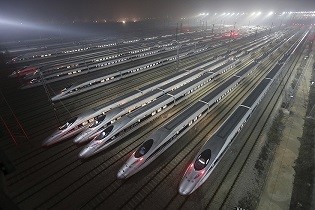The Beijing government has announced initial plans to build railways that would link Beijing to two Hebei cities and enable commuters to travel to Beijing in an hour, becoming the first railway to run through the region.
In an interview with the Legal Mirror, an official of the Beijing Major Projects Construction Headquarters Office said that the city will begin the integrated development of the Beijing-Tianjin-Hebei route this year to help ease transportation woes. The official added that the integration is part of the long-term plan for the region.
Once accomplished, the 70-kilometer Pinggu line will become the first railway to service the area.
Authorities have not yet bared the details of the plans, but they assured that the distance between the stations would still allow the trains to travel at the speed of up to 160 kilometers per hour.
According to a study conducted by the Beijing Municipal Commission of Transport in 2013, Beijing commuters spend an average of two hours traveling daily and the number of people using the rail services continue to rise.
In an interview with the Global Times, Zhan Zhuting, a professor at the Transport Management Institute in the government's Ministry of Transport, said that railways are preferred by commuters because they are more affordable compared to other means of transportation, in addition to their speed.
Zhan said that the Pinggu rail links are important in the development of the region as the rail networks would help connect places and integrate them in the Pearl River Delta region.
The report said that one station will be built in the Hebei cities of Sanhe and Yanjiao, which will benefit nearly 300,000 Yanjiao residents who travel to Beijing to work every day.
In December last year, the Beijing, Hebei and Tianjin governments have signed contracts with the China Railway Corporation, jointly establishing a company with a capital of 10 billion yuan ($1.59 billion) that will develop transportation infrastructure in the region.



























